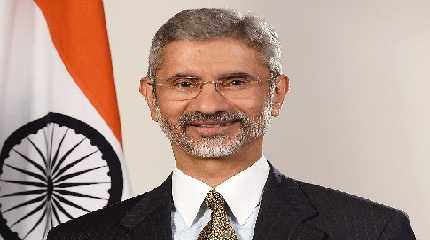
NEW DELHI (AP) — India will contribute half a million dollars to the United Nations’ efforts to counter global terrorism as new and emerging technologies used by terror groups pose fresh threats to governments around the world, the foreign minister said Saturday.
The money will go toward the U.N. Trust Fund for Counter Terrorism and will further strengthen the organization’s fight against terrorism, S. Jaishankar said as he addressed a special meeting of the U.N. Counter Terrorism Committee in New Delhi.
It was the first such conference — focused on challenging threats posed by terror groups in the face of new technologies — to be held outside the U.N.’s headquarters in New York.
Jaishankar said new technologies, like encrypted messaging services and blockchain, are increasingly misused by terror groups and malicious actors, sparking an urgent need for the international community to adopt measures to combat the threats.
“ Internet and social media platforms have turned into potent instruments in the toolkit of terrorist and militant groups for spreading propaganda, radicalization and conspiracy theories aimed at destabilizing societies,” he said in his keynote address.
Jaishankar also highlighted the growing threat from the use of unmanned aerial systems such as drones by terror groups and criminal organizations, calling them a challenge for security agencies worldwide.
“In Africa, drones have been used by the terrorist groups to monitor movements of security forces and even of U.N. peacekeepers, making them vulnerable to terrorist attacks,” he added.
British Foreign Secretary James Cleverly reiterated the dangers of unmanned aerial platforms, saying that such systems were being used to inflict terror, death and destruction.
“Drones are being used currently to target critical national infrastructure and civilian targets in Russia’s brutal invasion of Ukraine,” he said. “This is why we have sanctioned three Iranian military commanders and one Iranian company involved in the supply of drones.”
The special conference kicked off on Friday in Mumbai, India’s financial and entertainment capital, which witnessed a massive terror attack in 2008 that left 140 Indian nationals and 26 citizens of 23 other countries dead by terrorists who had entered India from Pakistan.
Jaishankar on Friday said India regretted the U.N. Security Council’s inability to act in some cases when it came to proscribing terrorists because of political considerations, undermining its collective credibility and interests. He did not name China but referred to its decision to block U.N. sanctions against leaders of Jaish-e-Mohammad, a Pakistan-based extremist group designated as a terrorist organization by the U.N.
India and the United States sought the sanctions earlier this year. China put the proposed listing of the two terrorists for sanctions on hold on technical grounds, saying it needed more time to study their cases.




